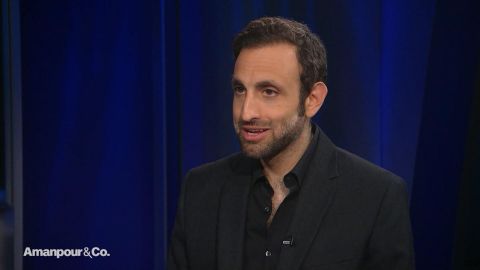Read Transcript EXPAND
CHRISTIANE AMANPOUR: Tell me about how your experience plays in to this investigative journalism.
TIM SAMUELS: Yes. I mean I think when you’re saying that men need to be candid you’ve got to talk the talk as well. And you know I’ve been quite honest about the times that I’ve had wobbles. And for my sanity and serotonin tends to be affected by how work’s going, which I think is true for a lot of men. When things are going great and you’re busy, you feel pretty robust. But when things aren’t and you’re not — the hunt and gathering isn’t going so well that leaves you to feel — that leaves you feeling quite vulnerable. And you saw that in the last recession there was a spike of 10,000 additional male suicides directly attributed to that. So I think it’s — it’s important for a man to admit that sometimes we have a hard time, which makes it that much easier for the next guy that comes along and when someone like William or Harry, who’s also been really articulate about this, does it, it just makes it that much easier for the next guy. Even someone like Tony Soprano as a fictional character getting some therapy makes it that much easier for you to say I’m going to go and see a therapist too.
AMANPOUR: That is really interesting. And — and you’re absolutely right. It was the first sort of macho male figure that we saw practically getting regular weekly therapy sessions on that unbelievable series. How does this — we sort of touched a little bit on — but how does this effect and show up in politics today. I mean whether it’s in the U.S., Britain, Europe, wherever it might be?
SAMUELS: I think to understand this you have to look at the power of loss. It is a sensation which has twice the pleasure — twice the intensity of pleasure. It’s what keeps you awake at night. And loss is something, which if you’re a man on — on your downers; you — you’ve lost your job, your status, maybe your relationship, your sense of purpose, what — what you’re getting for in the morning and that makes you desperate. And like a gambler who’s desperate to regain their losses that the roulette wheel, you’re sometimes willing to try something radical. You bet on something you might not entirely agree with, you’d turn the table over. So I think that makes you riper for the radical politician who comes along and says trust me, I’m going to change it.
AMANPOUR: You know we’ve been actually exploring this quite a lot this week and — and last week. And — and it is that kind of disconnection and isolation that has drawn quite a few boys, men in the past to all sorts of gangs and — and militant organizations. So I mean it is really interesting how that’s playing out. But you know you said and u didn’t say it in this book but you have said we’re still walking around in the bodies designed for hunter-gathering. We’re cavemen in suits but living lives totally ill-suited for that design. And like a bad OS, we’re constantly crashing. There are smart new ways to feel like a man, which respect the bodies we’re in and the ways we’ve lived for millennia. What are the smart ways?
SAMUELS: So if we are tribal animals, at the moment, we live in this kind of terribly isolated lives, which – and we’re not in unions anyone. We don’t have an extended family. So what can you do to spend time with your tribe?
About This Episode EXPAND
In an exclusive interview, Christiane Amanpour speaks to former British Prime Minister Gordon Brown, as Britain readies itself for a new Prime Minister and what that could mean for Brexit and unity within the nation. Chris Arnade joins Michel Martin to discuss his new book, “Dignity.” Tim Samuels argues for a new way of dealing with a society plagued by toxic masculinity.
LEARN MORE


